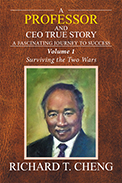
 |
A Professor And CEO True Story: A Fascinating Journey to Success: Volume 1: Surviving the Two Wars
by Richard T. Cheng
Xlibris
The author was born in China and is descended from two prominent families. His father became the wartime military officer in charge of arranging the movement of high-ranking personnel, families, and documentation of the Nationalist Government around the country for safekeeping. Born just before the start of WWII, Cheng accompanied his mother in following his father’s many moves. They alternately lived in grass huts rented from rice farmers to government buildings/dormitories and back to poverty-level homes. At times they lacked proper sanitation facilities and clean water.
The author missed much early schooling. Instead, he learned hands-on mechanical skills from soldiers and multiple Chinese dialects from local children. With meat rationed during the war, the boy Cheng caught eels in the rice fields which his mother cooked to supplement vegetable meals. They road in trucks seated upon crates or spent hours on trails into the country atop hwa-gers (bamboo poles with seats carried on the backs of men). Robbed of their possessions and the family jewels, they kept up their spirits and managed to preserve early family photographs. A young child at the start of the Japanese invasion, Cheng never realized until in his pre-teen years the prominence of his lineage and the property that both families owned. They would have to give all these things up to flee from Communist soldiers, along with the Nationalist Government, to the safety of Taiwan. Thus ends Volume 1 of 4 in the author’s autobiography.
Politics in Japan and in China during the decade covered in this volume played significant roles in the author’s true story. In the book, Chinese citizens called the Japanese “Short Bandits” and considered them “vicious animals.” To determine the truth, one must turn to Japanese history. For centuries their government consisted of two main branches: the Emperor and the military assigned to protect him. At times, military factions would fight for that right of service. These factions became exceedingly vicious in their methods of warfare. Sending an unhappy faction off to war against an enemy country became a political maneuver that kept a stable balance of power within the island nation. With few supplies provided and no rules of engagement limiting actions, Japanese soldiers fought viciously against the citizens. Burning cities, brutal killings, and heinous rapes were the rule.
This book explains how Communist rebels won the support of Chinese workers. As war with Japan dragged on, certain high-level Nationalist officials realized that they would soon lose control of the government. They decreed that everyone must turn over to the banks silver coins in exchange for paper gold certificates. Cheng’s mother, in blind faith, obeyed this order. Promptly, the greedy officials sent all that silver offshore and devalued the paper money. Food and services became outrageously priced. People resorted to thievery to stay alive. The Communists used this political treachery to defeat the entire Nationalist government.
Cheng’s autobiography is a well-written, fast-paced read with insights into a culture and time about which few readers are informed. Readers will likely enjoy subsequent volumes that follow Cheng’s fascinating life and career. The author would later be called the “$240 Million Professor” in an article published in the May 1994 issue of the Transpacific Magazine.
RECOMMENDED by the US Review